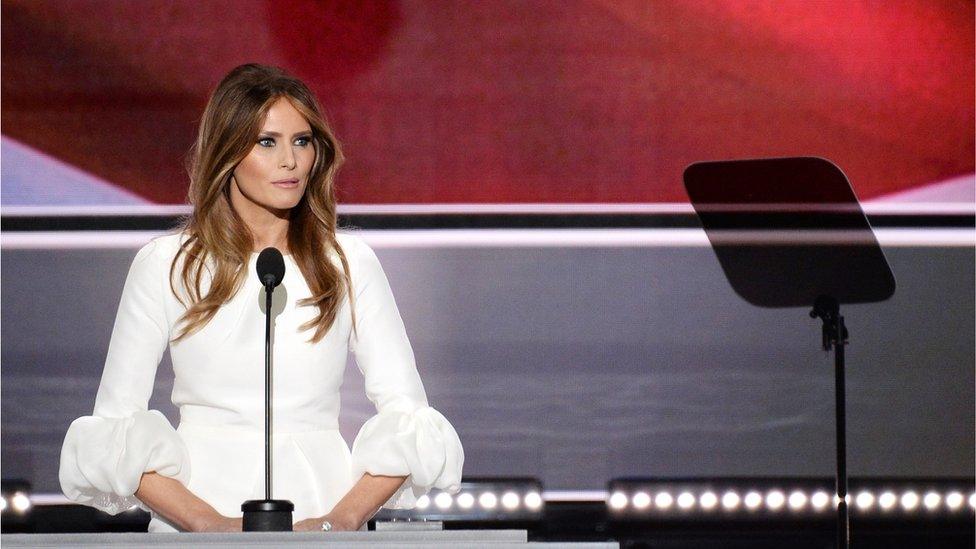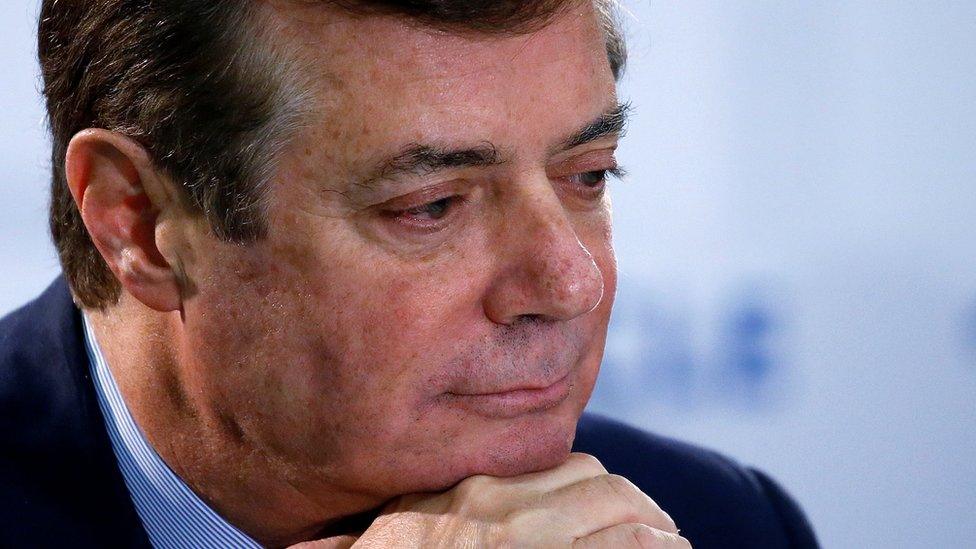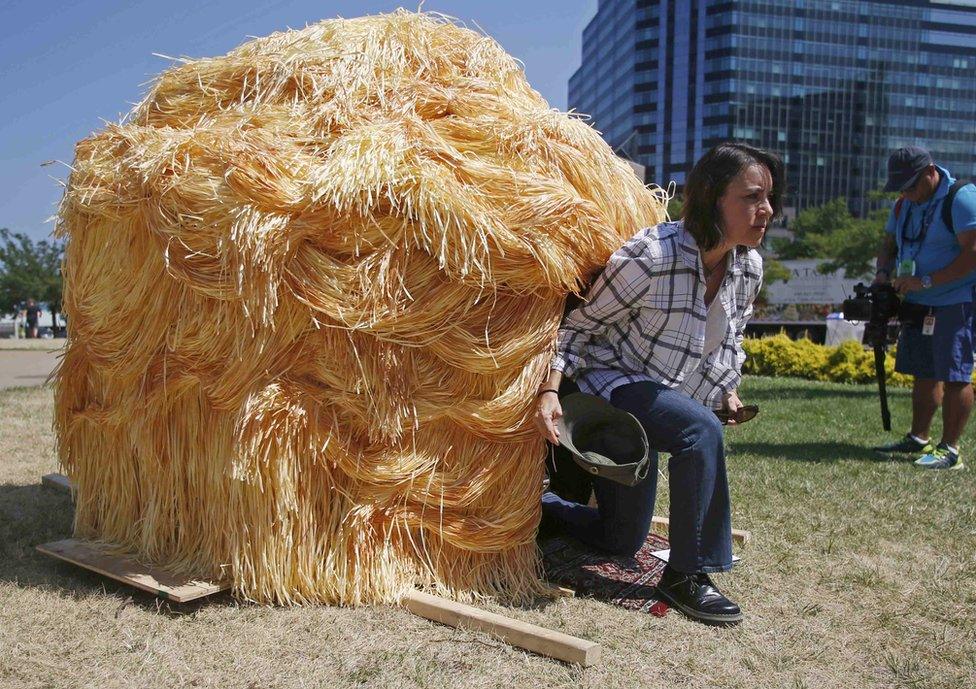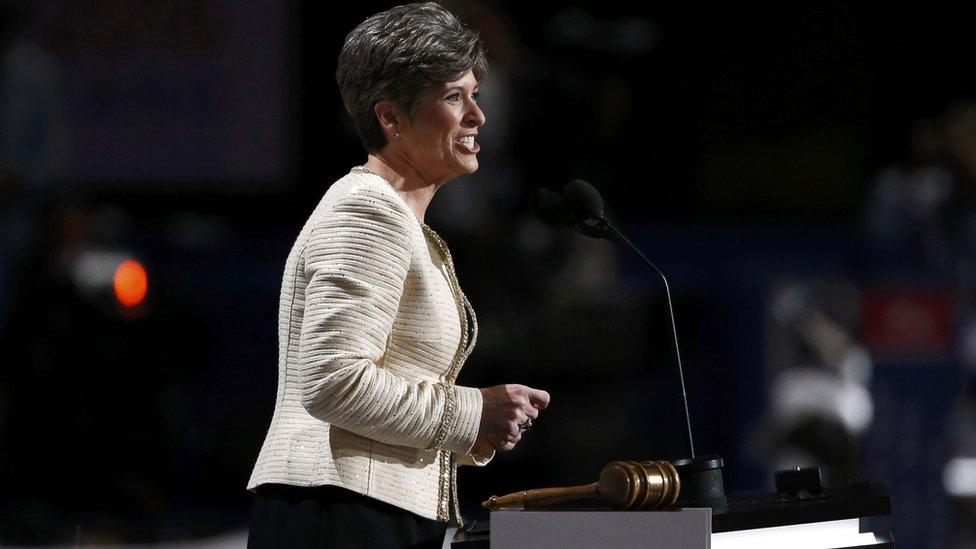US election: Why the Melania Trump plagiarism row matters
- Published

During her speech on Monday night - the non-controversial portion of it, that is - Melania Trump noted that Republicans would be in for a wild ride.
"It would not be a Trump contest without excitement and drama," she said, to laughs from the packed arena.
Those words proved to be prophetic.
There certainly has been plenty of drama surrounding allegations that Mrs Trump - or, rather, her speechwriter - plagiarised portions of Michelle Obama's 2008 Democratic National Convention address.
But is this a proverbial tempest in a teapot, as Trump campaign officials insist?
Here are five reasons why this episode could be much more than that.

Message blunted
The plagiarism controversy steps all over what should be one of the few moments of unadulterated good press during a presidential campaign.
The spouse speech is a rare opportunity to paint a human portrait of the presidential candidate, to put what should be that person's top character witness in front of a national audience.
This was a particularly important moment for Mrs Trump because she has kept such a low profile over the course of the campaign so far.
It was her coming out party, and instead of being able to herald her performance, the Trump team has spent the day doing damage control.
Paul Manafort, the campaign chairman, asserted that the episode was "totally blown out of proportion". He then went on the attack.
"This is, once again, an example of when a woman threatens Hillary Clinton, how she seeks out to demean her and take her down,'' he said. "It's not going to work."

Manafort blamed Hillary Clinton for the furore
Such attempts to redirect fire, however, have proven ineffective so far.
Republican Party Chairman Reince Preibus said Mrs Trump's speechwriter should be fired. And there are reports that Mr Trump is "furious" over the mistake.

Soundbite scandal
Did Melania Trump's speech copy Michelle Obama's?
Campaigns have to deal with mistakes and controversies all the time. The Trump staff certainly has plenty of practice - and success - defusing what could be touchy situations with their man.
Mrs Trump's story, however, is particularly challenging. Beyond just the bad timing, it's an easy controversy for people to wrap their heads around.
It can be distilled into a 30-second split-screen video of Mrs Trump and Mrs Obama repeating the same words, which can be played on cable news networks over and over again.
Whereas Mr Trump's dealings with his for-profit university or Hillary Clinton's involvement with her charitable foundation or her use of a private email server require long explanations and dense paragraphs, the Melania-Michelle mash-ups were ready to view by morning, and the snarky internet memes started appearing within minutes of the first news reports.

The wrong woman to copy
This isn't then-Senator Joe Biden plagiarising old Neil Kinnock Labour Party speeches, external during his 1988 presidential campaign (a scandal that sunk his candidacy, by the way).
Whoever wrote the aspiring first lady's address lifted full sentences from the current first lady - who is from the other party, no less.
On Monday, and throughout this week, convention viewers are going to be treated to a heavy dose of Obama-bashing.
All those attacks will be a little less effective when Democratic defenders can note with a smile that the Trump team obviously thinks enough of Mrs Obama to recycle some of her choice phrases eight years later.
As if that's not bad enough, the woman who wrote the original Obama speech in question is a former Hillary Clinton speechwriter.

Rifts exposed
Less than a month ago, Mr Trump fired Cory Lewandowski, the man who ran the Trump team through its successful primary campaign, and replaced him with longtime Republican insider Paul Manafort.
The Melania speech, however, has given Lewandowski a chance for a bit of political payback - and could re-open wounds that have yet to heal.
"Whoever signed off, was the final sign off, that allowed this to go forward should be held accountable," Lewandowski said on Tuesday morning. "I think if it was Paul Manafort, he would do the right thing and resign."
Manafort is still standing - and tells the media that no one will be fired for the mistake. For now.

Not ready for prime-time

Attention has been diverted away from Donald Trump
Over the past few months, the Trump presidential campaign has been dogged by criticisms that it's a haphazard operation being run by a ragtag collection of novice operatives (Lewandowski) and over-the-hill political hands (Manafort).
The Melania Trump story, if it was just an isolated incident, would be embarrassing. As it is just the latest in a string of missteps, it plays into a dangerous narrative.
Last week, the campaign botched the unveiling of Mike Pence as Mr Trump's vice-presidential nominee. Word leaked out early, the announcement was postponed a day, and the runners-up were informed of the decision late (or perhaps not at all).
On Monday afternoon, Republican leaders and the Trump campaign had to deal with a rebellion on the floor from anti-Trump die-hards over what should have been a routine procedural vote. Some delegates were outraged, and Republican convention officials were showered with boos.
Even the scheduling of the first night's speakers was awkward. Typically, the spouse of the candidate - the highlight of the show - closes out the evening's proceedings. Instead, several other speakers followed her, including retired General Michael Flynn - who was on Mr Trump's vice-presidential short-list - and rising star Iowa Senator Joni Ernst.

Joni Ernst spoke, but who knew?
Convention attendees streamed to the exits during Mr Flynn's speech, and Ms Ernst spoke to a largely empty convention hall.
Political conventions are where the parties are supposed to put their best foot forward and launch their candidate toward victory in November. Usually the nominee receives a nice polling bump from the wall-to-wall media coverage and the opportunity to directly talk to US voters.
That may still happen. There are three nights of speeches left to get through, and past viewership numbers indicate the US audience only really begins to pay attention later in the week.
Mr Trump's acceptance address on Thursday will be a chance to recover. But, for the moment, the picture being presented is not one of smooth sailing but of a campaign on the ropes.